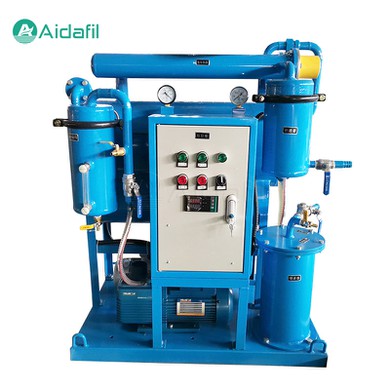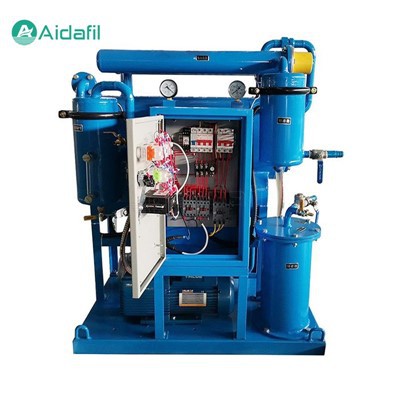
High Efficiency Vacuum Dewatering Oil Purifier For Refrigeration Oil Filtration
The high efficiency vacuum dewatering oil purifier for refrigeration oil filtration utilizes advanced technology to remove water and other contaminants from refrigerant oils. By exposing the oil to a high vacuum environment, these devices lower the boiling point of water, allowing it to evaporate and be extracted from the oil.

The high efficiency vacuum dewatering oil purifier for refrigeration oil filtration utilizes advanced technology to remove water and other contaminants from refrigerant oils. By exposing the oil to a high vacuum environment, these devices lower the boiling point of water, allowing it to evaporate and be extracted from the oil.
Parameters
Flow rate (L/min) --- 25 ~ 200
Working pressure (Mpa) --- 0.6
Rated vacuum (Mpa) --- ≤ -0.095
Water content (ppm) --- 5 ~ 30
Coarse filtration (μm) --- 100
Grade 1 filter rating (μm) --- 10, 20
Grade 2 filter rating (μm) --- 3, 5
Pressure differentials (Mpa) --- 0.2
Key Features
1. Exceptional moisture removal. The high efficiency vacuum dewatering oil purifier can achieve extremely low moisture content levels, typically below 30 ppm, ensuring optimal oil properties and preventing issues associated with water contamination.
2. Efficient particulate filtration. Fine-mesh filters provide superior particle retention capabilities, protecting compressor components from abrasive wear and prolonging oil life.
3. Versatility. The vacuum dewatering oil purifier can handle a wide range of refrigeration oils and refrigerants, making them suitable for diverse applications and system configurations.
4. Continuous monitoring and control. The oil purifier unit features built-in sensors and controls for real-time monitoring of oil condition, enabling proactive maintenance and ensuring consistent oil quality.
How It Works
The high efficiency vacuum dewatering oil purifier utilizes a unique combination of vacuum dehydration and advanced filtration techniques to remove water, gases, and impurities from refrigeration oils. The process begins with the introduction of the contaminated oil into the purifier, where it is heated to increase its fluidity and reduce the viscosity of any trapped water. The oil then passes through a series of filters, progressively removing solid impurities and water droplets.
Simultaneously, a vacuum is applied to the oil, reducing its boiling point and facilitating the evaporation of any remaining water and volatile gases. These evaporated substances are then condensed and separated from the oil, leaving behind a purified product that meets or exceeds the original equipment manufacturer's (OEM) specifications.
The Importance of Refrigerant Oil Quality
1. The Function of Refrigerant Oils
Refrigerant oils serve multiple functions within refrigeration systems. They act as lubricants for moving parts, reducing wear and tear and extending the lifespan of the equipment. Additionally, they provide thermal conductivity between the refrigerant and the surrounding components, improving energy transfer and overall system efficiency.
2. Common Contaminants in Refrigerant Oils
Water is a common contaminant in refrigerant oils, introduced through various means such as atmospheric moisture or improper charging practices. Other impurities may include air, particulate matter, and chemical breakdown products from the refrigerant itself. These contaminants can compromise oil quality and lead to issues such as corrosion, foaming, and reduced heat transfer capabilities.
3. Consequences of Oil Contamination
Contaminated refrigerant oils can have significant consequences for the performance and longevity of refrigeration systems. Increased friction due to inadequate lubrication can cause premature wear and tear on mechanical components, while reduced heat transfer capabilities can result in higher energy consumption and decreased cooling capacity. In severe cases, oil contamination can lead to system failure and costly repairs.
Utility in Various Industries
1. Food Processing and Preservation
In the food processing industry, maintaining the quality of refrigerant oils is crucial for ensuring the safety and freshness of perishable goods. High vacuum dewatering oil purifiers can help prolong the shelf life of products by ensuring that refrigeration systems operate at peak efficiency, preventing spoilage and reducing waste.
2. Pharmaceutical Manufacturing
The pharmaceutical industry requires precise temperature control during the manufacturing process to ensure the stability and efficacy of drugs. By maintaining clean and efficient refrigerant oils, high vacuum dewatering oil purifiers can contribute to the production of high-quality medications and protect against costly recalls or product loss.
3. HVAC Systems for Commercial Buildings
Large commercial buildings with extensive heating, ventilation, and air conditioning (HVAC) systems rely on efficient refrigeration oil to maintain comfortable indoor environments. High vacuum dewatering oil purifiers can help reduce energy costs and improve indoor air quality by ensuring that HVAC systems operate smoothly and reliably.
4. Industrial Processes Requiring Strict Temperature Control
Industries such as semiconductor manufacturing, chemical processing, and power generation often require precise temperature control to ensure product quality or safety. High vacuum dewatering oil purifiers can play a critical role in maintaining the integrity of these processes by ensuring that refrigeration systems operate efficiently and without interruption.
Maintenance
Maintaining the high efficiency vacuum dewatering oil purifier is essential to ensure its effectiveness and extend its lifespan. Regular maintenance includes changing the filters, checking the vacuum system, and cleaning the machine. It is also important to properly store the machine when it is not in use, to prevent damage and ensure that it is ready for use when needed.
FAQ
1. What is an oil purifier, and how does it work?
An oil purifier is a device designed to remove impurities and contaminants from used oil, making it suitable for reuse or safe disposal. It works by passing the oil through various filtering elements, which trap the particles and impurities while allowing clean oil to pass through.
2. What types of oils can be filtered using an oil purifier?
Oil purifiers can be used to filter various types of oils, including the transformer oil, turbine oil, lubricating oil, hydraulic oil.
3. Can I dispose of the filtered oil safely?
Yes, once the oil has been filtered, it can be disposed of safely, provided that it meets the local regulations and guidelines for waste oil disposal. Be sure to check with your local authorities or waste management companies to determine the proper procedures for disposing of filtered oil in your area.
4. Is it cost-effective to invest in an oil purifier?
Investing in an oil purifier can be cost-effective in the long run, as it allows you to reuse filtered oil, reducing the need for frequent oil changes and the associated costs. Moreover, maintaining clean oil helps extend the life of equipment and reduces the likelihood of costly repairs due to premature wear and tear.
Why choose us
· Professional manufacturer with many years' experience
· Good quality with competitive price
· OEM & ODM are welcome
· Various payment items are acceptable
· Good service by experienced manager
Enterprise tenet: Honest first, quality foremost
Operation belief: Establishment of AIDA brand and satisfaction of users are our persistent pursuit.
Service tenet: Responsible for every procedure; responsible for every machine; responsible for every customer.
Hot Tags: high efficiency vacuum dewatering oil purifier for refrigeration oil filtration, China, factory, price, buy, Lube Oil Filter Elements, glass fiber oil separator filter, high precision automatic self cleaning filter, pleated cellulose air filter compressor, coalescing filters for air powered tools, Compressed Air Coalescing Filter
← Multi Functional Highly Efficient High Solid Content Oil Purifier
Insulating Oil Filtration Coalescence Dehydration Oil Purification Machine →







